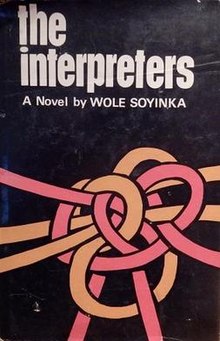The Interpreters (novel)
 | |
| Author | Wole Soyinka |
|---|---|
| Language | English |
| Publisher | André Deutsch |
Publication date | 1965 |
| Media type | |
| Pages | 253 |
The Interpreters is a novel by Wole Soyinka, first published in London by André Deutsch in 1965[1] and later republished as part of the influential Heinemann African Writers Series.[2] It is the first and one of the only three novels[3][4] written by Soyinka; he is principally known as a playwright. The novel was written in English and later translated into a number of languages.[2]
Plot[edit]
The novel is set in the 1960s, in post-independence and pre-civil war Nigeria, mainly in Lagos. There are five main characters in the novel: the foreign ministry clerk Egbo, the university professor Bandele, the journalist Sagoe, the engineer turned sculptor Sekoni, and the artist Kola. They were friends at high school, then went abroad to study, and returned to start middle-class jobs in Nigeria.
Style[edit]
The narrative of The Interpreters seems chaotic, with Soyinka constantly returning to past events, and some effort is needed for the understanding of even the main characters, especially Egbo and Sagoe. Many other characters (university professors, editor board of the newspaper where Sagoe works at) are given schematically, fully conforming to the prevailing stereotypes of the era. This is because the novel was published in the 1960s, shortly after many of the African states became independent, and in fact Soyinka tried to build his narrative in order to oppose the stereotypes that were generally included in a post-colonial novel.[5] The structure of the narrative also ultimately forms a comment on the events that occur in the lives of several characters.[6]
Reception[edit]
Thomas Lask, writing for The New York Times, took issue with the "diffuse" construction of the novel.[7] However, his review was positive, praising the combination of "esthetic and political problems".[7] The novel has been referred to as "difficult" and as "never having received the attention it deserved".[8]
References[edit]
- ^ The interpreters. OCLC 1842667. Retrieved 28 September 2021.
- ^ a b Gillard, Garry (2011). "The Interpreters". Murdoch University. Retrieved 18 July 2015.
- ^ "Wole Soyinka | Biography, Plays, Books, & Facts | Britannica". www.britannica.com. 2023-07-09. Retrieved 2023-07-29.
- ^ "The Nobel Prize in Literature 1986". NobelPrize.org. Retrieved 2023-07-29.
- ^ Dellal, Mohamed. "The Interpreters' Cultural Politics, Or Soyinka's Postcolonial Otherness". Postcolonialweb. Retrieved 18 July 2015.
- ^ Wynne Gunner, Elizabeth Ann. "African literature". Britannica.com. Retrieved 3 November 2016.
- ^ a b Lask, Thomas (11 August 1972). "Books of The Times". The New York Times. Retrieved 2 November 2016.
- ^ Kinkead-Weekes, Mark (1980). "The Interpreters - A Form of Criticism". Critical Perspectives on Wole Soyinka. Three Continents Press.
